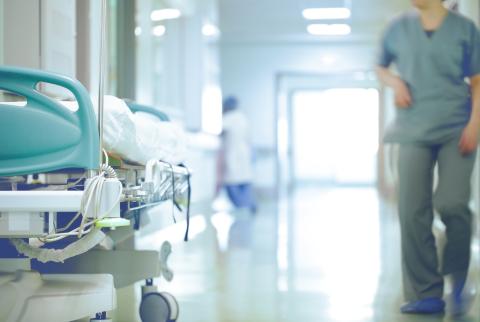
Université Paris-Saclay involved in two University Hospital Institutes (IHU)
As part of the France 2030 investment plan, the President of the French Republic has announced twelve University Hospital Institutes (IHU) which have won the national IHU 3 call for proposals. The PROMETHEUS IHU and the PRISM IHU projects are among the laureates.
Université Paris-Saclay is the coordinator of the PROMETHEUS IHU, alongside Université de Versailles Saint-Quentin-en-Yvelines (UVSQ), the French Alternative Energies and Atomic Energy Commission (CEA), Public Assistance - Hospitals of Paris (AP-HP) and the National Institute of Health and Medical Research (Inserm), and is the co-coordinator of the PRISM IHU, with Gustave Roussy, CentraleSupélec, Inserm and Unicancer.
PROMETHEUS
The future global centre for research, education and care aims to reduce the number of deaths and sequelae caused by sepsis by half within the next ten years. Sepsis is the most serious complication of an infection. It is characterised by uncontrolled inflammation - the physiological process by which the body eliminates pathogens, resulting in the impairment of vital functions. According to the World Health Organisation, each year sepsis affects 50 million children (mainly under the age of one) and adults (over the age of 75). The majority of cases occur at home. Sepsis is responsible for one in four deaths worldwide and for mental and motor disabilities in one in two survivors.
Despite decades of extensive research, the mechanisms by which the host response to pathogens is disrupted remain poorly understood, and no treatment has been found.
The PROMETHEUS IHU shares a threefold scientific objective. Firstly, the project aims to improve our understanding of the host-pathogen interactions that lead to the progression of an uncomplicated infection to sepsis. This will allow for the identification of signatures characterising the trajectory of each individual affected by an infection (endotype), and their response to a given treatment (treatable traits). The setting up of a prospective cohort will be a major support for characterising these individual sepsis profiles.
Secondly, the project aims to develop, validate and commercialise a rapid testing platform (allowing over 200 tests of treatable endotypes and traits to be performed in two hours), which will lead to the creation of a digital twin of organs and systems to help decide treatment regimens without delay. Early decision making in under six hours after the onset of symptoms, is critical to the success of treatment.
The project’s third goal aims to develop customised medicine with innovative small molecules such as nanomedicines, biotherapies (monoclonal antibodies and vaccines targeting pathogens and the immune system), and strategies modulating microbiota.
The project’s coordinators are Djillali Annane, Professor at UVSQ, Head of the intensive care medicine department at the Raymond-Poincaré Hospital (AP-HP), and Head of the LARENES team at the Inflammation and Infection Laboratory (UVSQ/UPSaclay/Inserm), Olivier Lambotte, Professor of Clinical Immunology at Université Paris-Saclay, and Roger Le Grand, Director of IDMIT at the CEA. Together, they bring together 60 research teams in chemistry, physics, mathematics, engineering sciences, biology, medicine, social and human sciences and economics. The 275 researchers and 94 clinical doctors of this unique institute for care, research and education can count on leading industrial partners: Arkhn, Baxter, Biomérieux, Biothelis, Pfizer, Primadiag, Sphingoteck and Volition. The ambitious project also involves patients through the participation of patient associations in France (France Sepsis Association) and from around the world (European Sepsis Alliance, Global Sepsis Alliance and Sepsis Canada).
PRISM
This multidisciplinary programme aims to obtain a better understanding of the biology of each patient’s cancer to reduce mortality. The goal is to identify patients with the most aggressive forms of cancer as soon as they are diagnosed and characterise the biology of the disease, in order to offer patients the most suitable treatment from the very start, thanks to accurate risk assessment.
With the creation of the Paris-Saclay Cancer Cluster close to Gustave Roussy, the attribution of the IHU status is part of a broader ambition to create the largest cancer campus in Europe. It will provide the optimal conditions for exploring promising diagnostic, therapeutic and preventative approaches, transforming discoveries into concrete applications as quickly as possible for the benefit of patients.
Prism develops an integrative translational research approach, using innovative methodology and tools: artificial intelligence, epigenetics, clonal tumour heterogeneity using circulating DNA analysis, spatial biology and the study of microbiota. This exhaustive molecular profiling should lead to the creation of a digital map summarising the biology of each patient, hopefully making it possible to identify new biomarkers and treatment response predictors (drug sensitivity, toxicity).
GenoTher Bio cluster
Last but not least, Evry University is co-founder of the GenoTher bio cluster, with Généthon, Genopole, Yposkesi, AP-HP, Inserm, and Spark. GenoTher brings together over 30 players working in gene therapy, including leading academic institutions and hospitals, and a dozen private and venture capital companies, all located in the Paris-Evry area.
The bio cluster aims to establish a leading ecosystem in France dedicated to gene therapies, in a context where, by 2025, more than 20% of new products launched will be gene therapies.
